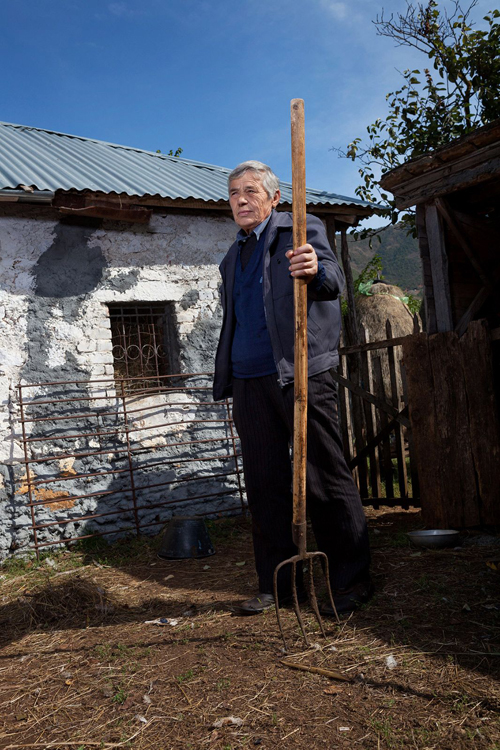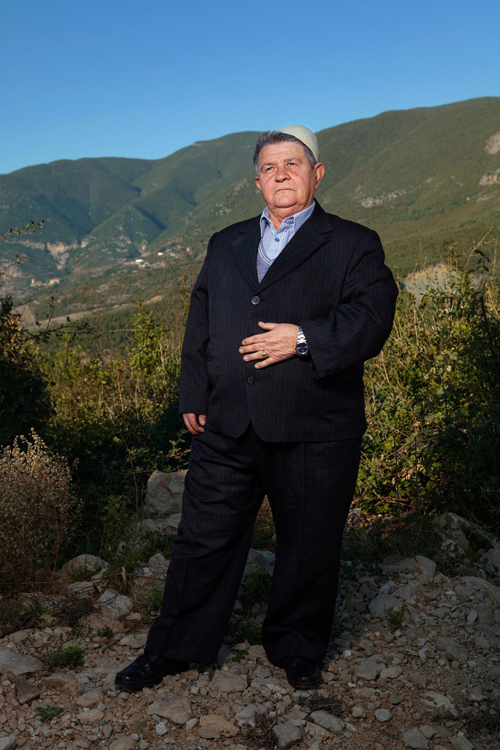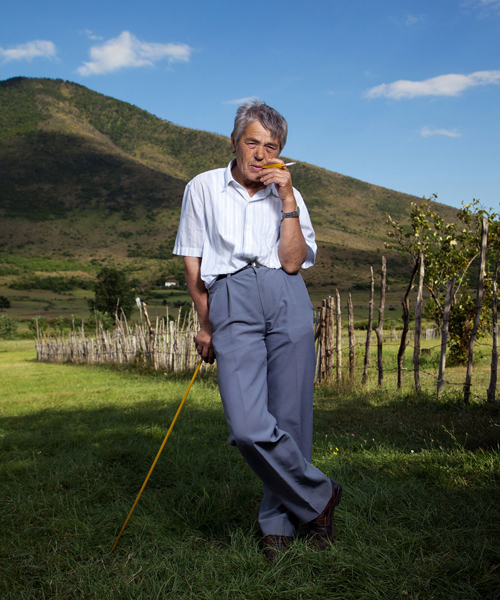By Gabrielle. Photos by Jill Peters.
A few months ago, I read an article about the Sworn Virgins of Albania. It’s a fascinating article, and I hope you’ll read it. The summary: in communities organized under the Kanun code of honor, families without sons risked losing land and livelihood. As a workaround, families could assign one of their daughters to live a life of celibacy as a burrnesha, or sworn virgin. “Becoming a burrnesha elevated a woman to the status of a man and granted her all of the rights and privileges of the male population.”
As you can see, these women have lived their adult lives as men. To be clear these are not women who identified as men and had sex changes. No. Not at all. They were born and raised as females, then at some point, they were asked by their family to live their lives as males. And so they did.
This is one of many articles about gender I’ve read lately, but it really stuck with me and I’ve wanted to talk with you about it. I don’t have a specific point about the topic at all. I just want to discuss it with you. Every time I think I’m getting a handle on what gender is and what gender isn’t, I come across another article or essay that expands my brain a bit further and reminds me that I really know nothing at all when it comes to this topic. And I’m wondering what your thoughts are.
Ten years ago, I was having all sorts of conversations about sexual orientation, but gender never really came up. In fact, at that time, if you had asked me the difference between sex and gender, I would have thought the words were the same, totally interchangeable. Five years ago, I would have answered that sex referred to sex organs, and gender referred to being a girl or a boy. If you asked me now? I would say: I’m still learning.
Sometimes I feel like I have a handle on the term sex. I think of it as a medical term. Does a person have sex organs? Yes? What kind? Male organs? Female organs? Both? None? Partial parts of one or the other? Partial parts of both? Does the person have a Y chromosome? Two X chromsomes? Some other variation that I know almost nothing about?
And why specifically would I need to know? Well, I wouldn’t. It’s none of my dang business. As a parent or caregiver, I assume the knowledge would mostly be important to answer related health questions or reproductive questions.
I think the biggest thing I’ve learned as far as the term sex goes, is that I used to assume the options were male and female and that’s it. But for a considerable number of the human population, that is not true. There are more options than simply male and female.
And yet, even with all the variation, I would still argue that between sex and gender, sex is the simpler term.
So let’s talk about the more complicated term: gender. In a recent discussion, a transgender friend said to me, “You are born with your sex. Your gender is assigned to you at birth. Gender is a cultural construct.” When he said that to me, I immediately remembered the Sworn Virgins article and thought, yep, I agree, these women switched to living as men like it was a role in a play. One day they were women, the next day they were men. No medical intervention involved. Their culture just gave them permission to do so, accepted their decision, and treated them accordingly.
The next thing I thought of was the colors pink and blue, our long-time symbols for baby girls and baby boys. But it turns out, the opposite used to be true. Historically, pink was for boys and blue was for girls. And then at some point it switched. And perhaps it will switch again. And again. Culture changes. If we were to take a survey of gender definitions around the world right this minute, it would generate vastly different answers. Something that’s feminine in one culture, can be masculine in another.
But even if I agree and accept the statement,”Gender is a cultural construct”, my mind still gets stuck sorting it all out. I imagine it’s because our culture has put a ton of weight and importance on gender, and certainly it has affected me and everyone else in ways we probably don’t even know yet. The first question we ask of a pregnant woman: Is it a girl or a boy? (I ask it every time. It’s like I can’t help myself.) Before ultra-sounds were invented, it was the first thing said about a new person at their birth. It’s a boy! Or, It’s a girl!
We put a ton of emphasis on gender from the moment a person exists. And for many of us, our own gender is clear. We are comfortable with the gender we were assigned. We never question it. It feels right. And we assume everyone else must feel the same clarity about their assigned gender. Though we’ve learned that’s not the case at all. Not everyone feels comfortable with the gender they are assigned.
It seems to me, that since I easily identify as a women that it would be easy for me to define what it means to be female, what it means to be a woman. But instead, it’s not easy. In fact it’s kind of impossible. Anytime I try to start a statement with “Most women like [blank]”, I can’t fill it in. Most women like nail polish? Nope. Most women like dancing? Nope. Most women like babies? Nope. Most women like pink? Nope. Most women like dresses? Nope. Most women like baking? Nope. Most women like to nurture? Nope.
So is it simply about our sex organs? That doesn’t work either. If a woman has a hysterectomy, we still consider her a woman. Is it a hormone thing? Is it the hormones running through our bodies that make us feel like we’re a specific gender? Maybe. But what about the Burrneshas? Their community considers them male. They live as males. Would we insist that they are female since they don’t have certain amounts of certain hormones?
I also think back to caveman era. Was gender important then? If yes, how would cave people have defined a man or a woman? Certainly, most of our current feminine stereotypes would not apply. No makeup, no curling irons, no fashion. What stereotypes would apply? That cavewomen had babies? Okay. But what about the ones who didn’t have babies, were they still recognized as women? Did it matter?
It’s also clear that our kids are growing up with a different concept of what gender is than the binary I was raised with. From what I’ve observed, for them, gender is more fluid and less important. One of Oscar’s best friends is genderless. Oscar’s whole grade (he’s a 5th grader) knows this and accepts the fact without any worry; it will never be anything but normal to them. Which seems like a step in the right direction. But perhaps the acceptance in our school is an exception.
How about you? What are your thoughts on gender these days? Have you read anything interesting that you learned from? I’d love the link! Do you feel like your views on gender have shifted? Does your gender mean a lot to you personally? Meaning, do you strongly identify as a female or male? Will you be sad if gender lines fade in the future? If you identify as transgender, what do you wish people that are still learning about gender (that’s me!) knew? Also, does anyone disagree with me on the difficultly of defining gender? Maybe you have a definition you find to be spot on? Anything else on your mind gender-wise? I hope you’ll share!
P.S. — About 8 years ago I read the novel Middlesex. It’s excellent. And reading it was the first time I remember seriously considering the experiences of those who aren’t strictly female or male. Have you read it?



Gabby, have you seen (or maybe it’s already been mentioned) The Gender Project? It’s at genderproject.org, a living and growing compilation of media by, for, and about individuals who identify as transgender, gender fluid, bigender, etc. compiled as a semester-long undergraduate journalism project by Sofia Adams, it continues to grow and expand. Ms. Adams is always looking for more contributors, too.
This is a topic that I always have a little struggle with. I see so many people that see gender identity as being a huge deal that they get stuck on. The reason I struggle is that on a conscious level as I meet people, I see them as people. I don’t really think, “oh there’s a man” I think “there’s a person”. I recognize that subconsciously is possibly a totally different story. I have an uncle that is gay, when I see him, I don’t see him as a gay person. He’s my uncle, he’s a person, and that’s what matters. Maybe I am wrong but I think that people put too much focus on gender and not enough on just being human and enjoying this human experience.
My thoughts on gender have changed a lot in the last few years as well. I came across this article today and immediately thought it might interest you.
I have to be honest here about my opinion although most likely it will not be popular.
I don’t think children should be encouraged to be genderless. It’s one thing to make a decision as an adult and accept others adult decisions with love and respect and acceptance. In no way am I saying we should not accept others but to encourage or allow children to get confused on gender I think borders on abuse. Children should be focused on growing and developing their personalities not being confused about sexuality at such a young age.
Also the about the Burnesha piece. Why isn’t anyone mentioning the fact that these were “women” who were “forced” to become men under the pretext of being given an elevated status ( sounds like brainwashing) These women have no choice but to accept! It’s total abuse.
I just came across your blog and was compelled to comment on this post. You ask great questions about what characteristics make a woman a woman. Julia Serano covers this in her book Excluded (she is a trans woman and a biologist), and it really made me think.
She explains, “Identity labels are a highly personal way of conveying to others how we believe that we fit (or don’t fit) into the world. Because they are so personal, often people who share the same trait or behavior may differ with regards to what identity labels they use to describe themselves.[…] It should be noted that people can use labels in either an essentialist or non-essentialist way.[…]I also happen to identify as a musician (because I play musical instruments) and as a bird person (because I have parrots as animal companions, not because I identify as a bird!). I do not believe that there is some magical underlying quality that all musicians, or all bird people, or all women, or all transsexuals have in common. Rather, the only thing we have in common is that we loosely share some non-essentialist quality (e.g., we play musical instruments, we have birds as animal companions, we move through the world as women, we identify and live as members of the sex other than the one we were assigned at birth, respectively.)”
That is, not everyone who shares those traits may identify in the same way (they are not essential/the determining factor to bring post of that group), but people who identify in those various ways share those traits.
I recommend that work and her earlier work Whipping Girl. Whipping Girl is about trans women but also about how the world scapegoats femininity. From what I’ve read on your site, I think you’d really enjoy it.